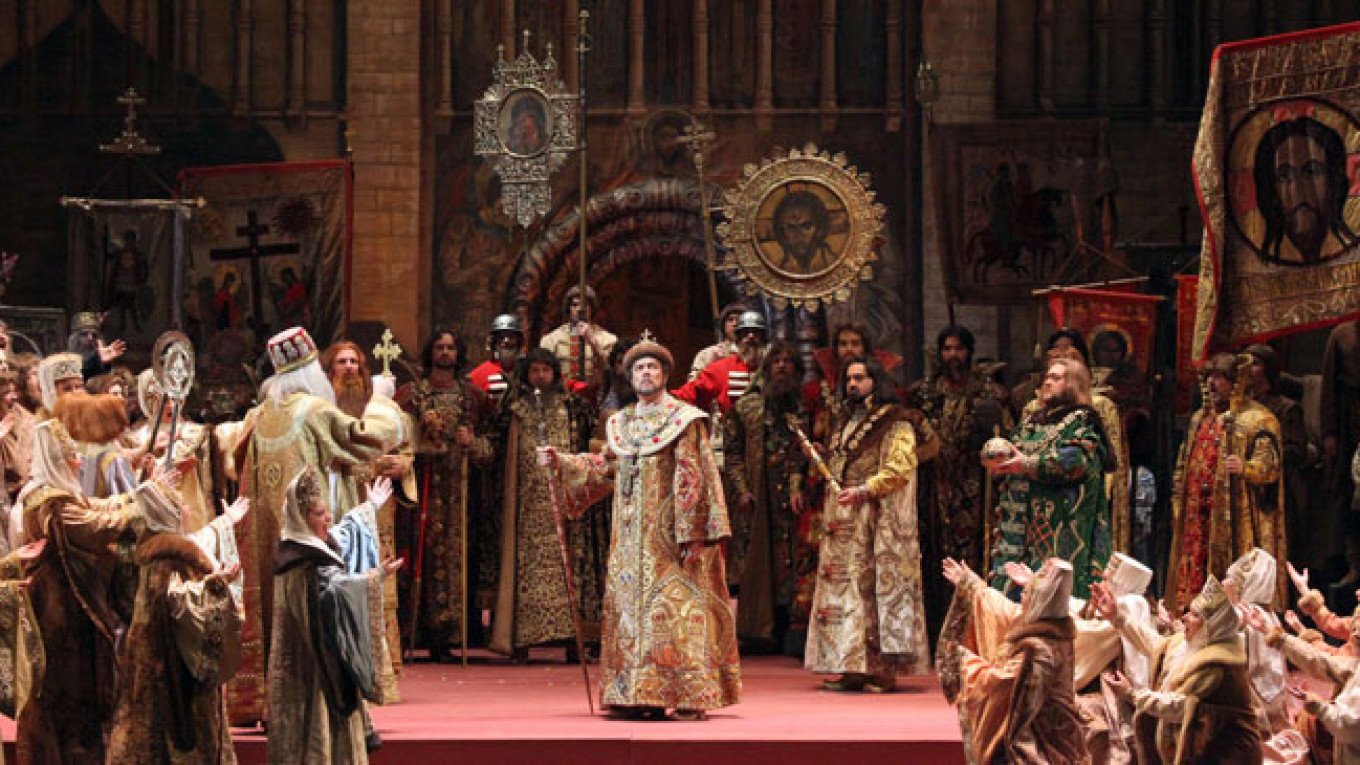The Bolshoi Theater recently announced its plans for the coming season, which opens on September 14 with a performance of Modest Mussorgsky's opera "Boris Godunov."
On the season's schedule are six new productions of opera, one of them in concert form and two imported from abroad, plus two new brand-new full-length ballets and the revival of another.
Newly appointed Bolshoi musical director and chief conductor Tugan Sokhiev makes his debut at the theater on September 26, leading the first of two currently scheduled concert performances of Pyotr Tchaikovsky's operatic setting of the Joan of Arc story, called "The Maid of Orleans." Perhaps Sokhiev will find a way to inject some real spark of life into this probably least inspired of the composer's eight operas.
Due to premiere on Dec. 14 is Giuseppe Verdi's popular "Rigoletto," absent from the Bolshoi's repertoire since late Soviet times. The production, staged by Canadian director Robert Carsen, originated at last summer's opera festival at Aix-en-Provence, in France, and has been making the rounds opera houses in Brussels, Strasbourg and Geneva.
Carsen's "Rigoletto" seems likely to be something of a shocker and will no doubt carry an "18+" on the Bolshoi's website and posters. Set in a circus ring, it has been variously described by critics as "terribly sexual" and "an up-market peep show." Conducting it will be the eminent Italian maestro Evelino Pido.
The Bolshoi's other operatic import, due to premiere Feb. 27, is Tchaikovsky's "The Queen of Spades," in a staging by Russian director Lev Dodin that seems likely to prove a happy replacement for the dull and awkward production of the opera by Valery Fokin that has occupied the Bolshoi's stage for the past seven years.
Dodin's "Queen of Spades" first appeared 15 years ago at the Paris Opera and has subsequently been seen in Amsterdam and Florence. Conducting it will be the venerable maestro Mikhail Jurowski, father of Vladimir and Dmitry Jurowski, who currently serve as chief conductors, respectively, of Moscow's Svetlanov State Symphony Orchestra of Russia and its Russian Philharmonic.
Wolfgang Amadeus Mozart's "The Marriage of Figaro" has not been seen at the Bolshoi since a short-lived, but quite effective production of the mid-1990s. It returns April 24 in a staging by Moscow director Yevgeny Pisarev. Considering Pisarev's trite and rather messy staging last season of Gioachino Rossini's L'italiana in Algeri at the Stanislavsky and Nemirovich-Danchenko Musical Theater, he seems a curious choice to entrust with what is probably Mozart's supreme operatic achievement.
In the pit will be British conductor William Lacey, who seems on his way to establishing himself as an important figure on the Moscow operatic scene. Season before last, he drew rave reviews for his leadership of Benjamin Britten's "A Midsummer Night's Dream" at the Stanislavsky and Nemirovich-Danchenko. He returns there on June 10 to conduct a new production of Mozart's "Don Giovanni," having just last week led Musica Viva chamber orchestra in an overwhelmingly beautiful concert performance at Tchaikovsky Hall of the French version of Christoph Willibald Gluck's opera "Orpheus and Eurydice."
The Bolshoi's final new opera production of next season, like that of "The Queen of Spades," serves as a replacement for a much-disliked staging seen over recent seasons, namely, British director David Pountney's 2008 version of Georges Bizet's "Carmen," in which the entire action preposterously takes place in a cigarette factory.
Staging the new "Carmen" will be Alexey Borodin, the highly regarded director of the Bolshoi's next-door neighbor, the National Youth Theater, and conducting it at its July 15 premiere will be musical director Tugan Sokhiev.
Also on the Bolshoi's operatic agenda is an opera aimed at younger audiences, Russian composer Sergei Banevich's "Kaya and Gerdy," which premieres on Nov. 28.
Returning on October 23, after more than a decade's absence, will be former Bolshoi ballet master Yury Grigorovich's masterful 1961 dance setting of an ancient Persian tale, titled "Legend of Love."
The same team responsible 11 years ago for the Bolshoi's sizzling and unhappily short-lived modern-dress staging of Sergei Prokofiev's ballet "Romeo and Juliet" — Moldavian choreographer Radu Poklitaru, British director Declan Donnellan and British designer Nick Ormerod — returns to the theater with its own jointly conceived version of "Hamlet," due to premiere next March 11. Currently, the team is negotiating for the rights to use as music Dmitry Shostakovich's 5th and 15th Symphonies.
The other new ballet of next season, scheduled for a debut on June 13, is a setting of Mikhail Lermontov's classic novel "A Hero of Our Time," with choreography by San Francisco-based Russian Yury Posokhov. Posokhov has already enjoyed much success at the Bolshoi with his choreography for Prokofiev's "Cinderella" and his "Classical Symphony," danced to the same composer's Symphony No. 1. Assisting with the staging and acting as designer will be Moscow director Kirill Serebrennikov, who is also responsible for the adaptation of Lermontov's story.
Contact the author at artsreporter@imedia.ru
A Message from The Moscow Times:
Dear readers,
We are facing unprecedented challenges. Russia's Prosecutor General's Office has designated The Moscow Times as an "undesirable" organization, criminalizing our work and putting our staff at risk of prosecution. This follows our earlier unjust labeling as a "foreign agent."
These actions are direct attempts to silence independent journalism in Russia. The authorities claim our work "discredits the decisions of the Russian leadership." We see things differently: we strive to provide accurate, unbiased reporting on Russia.
We, the journalists of The Moscow Times, refuse to be silenced. But to continue our work, we need your help.
Your support, no matter how small, makes a world of difference. If you can, please support us monthly starting from just $2. It's quick to set up, and every contribution makes a significant impact.
By supporting The Moscow Times, you're defending open, independent journalism in the face of repression. Thank you for standing with us.
Remind me later.






